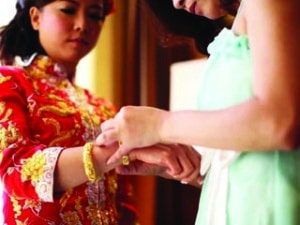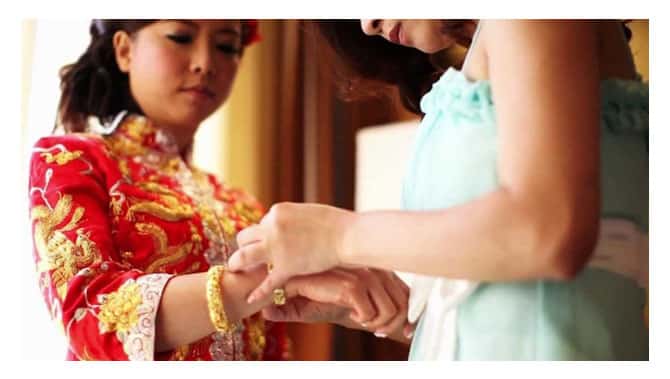 Recently, a 24-year-old Chinese girlfriend of mine complained that her parents are setting up 相亲 (“blind dates”) for her and making her attend even though she is reluctant. Usually, these single guys are introduced to her parents by their relatives, neighbors, or even colleagues. So far, she did not like anyone she has met, but her parents urged her to be “not too fussy” because she is “aging fast” and if she is too picky with guys she will become “齐天大剩” (a derogatory internet term for girls who are “leftover” in the marriage market, also known as “剩女”).
Recently, a 24-year-old Chinese girlfriend of mine complained that her parents are setting up 相亲 (“blind dates”) for her and making her attend even though she is reluctant. Usually, these single guys are introduced to her parents by their relatives, neighbors, or even colleagues. So far, she did not like anyone she has met, but her parents urged her to be “not too fussy” because she is “aging fast” and if she is too picky with guys she will become “齐天大剩” (a derogatory internet term for girls who are “leftover” in the marriage market, also known as “剩女”).
I raised an eyebrow.
“You’re only 24! There’s no reason for you to be worried. Just go to more social events and keep an open mindset to meet new people, and at some point, you’ll meet someone. Just let it flow naturally. Believe in serendipity.” I advised.
“Everyone I know is engaged or married. Some even have kids already. I don’t even have a boyfriend, so I can’t help but worry. My parents aren’t helping in the matter.” She concluded the conversation. “I really want to leave my home. If I were in a bigger city like Shanghai or Beijing, I may feel less pressured, but I’m in a small town in Hebei.”
My friend’s case is not an abnormal one. At only 25, China’s girls face the pressure to marry. If a girl is not concerned about it at that age, parents will start to seriously “worry.”

As someone who constantly browses through the Chinese internet, I am not shocked at my friend’s dilemma. However, I am surprised to have recently learnt that the word 剩女 (leftover women) was made popular by the All-China Women’s Federation and government sponsored programs. With the state as backup, the word quickly gained momentum amongst media such as TV, newspaper, magazines, and books.
Society’s intolerance for the so-called “Leftover women”, led by the state, may have stemmed from a fear of social instability caused by this phenomenon. Working together, the one-child policy since 1980 and sex-selective abortion (most non-city families do not wish for baby girls) have resulted in more men than women. This gender imbalance is already disrupting social order, for tens of thousands of Chinese men who cannot find spouses. What exacerbates the situation for the men is that nowadays, Chinese women are more independent socially and economically, so they are no longer willing to just “settle” for anyone in marriage. It is especially true that most Chinese women do not wish to marry men who wield weaker financial power or possess less social status. So in order to alleviate some stress on Chinese men and to restore social balance, the government put a stop to the one-child policy and is actively discouraging those women who are reluctant to settle in marriage. I see the end of one-child policy helpful to society because families will have more baby girls rather than aborting or even abandoning them to “make way” for a boy, and also, in the long run, the problem of an aging population can be solved. However, I do think that in the attempt to encourage marriage, calling unmarried women “leftover” is too harsh. I don’t think this kind of scare tactic should be implemented because it may cause anxiety and depression amongst women and that in itself is a force disruptive to social harmony.
So why did this “leftover women” term gain popularity among the common people? There are some cultural reasons as well. In a traditional Chinese society, the family is the fundamental block of society. One cannot become “stabilized” or “settled down” unless married and raising children, hence people married in their teens. Though today we are in the 21st century, some people still have the idea that girls should marry early when their “skin is still smooth and hair still luscious”. A 30-year-old unmarried woman is viewed as “too old to marry”, or even “weird” (with a negative connotation). Those around her may even talk about her behind her back about her “unhappiness” and “failure”.

From my perspective, a woman should marry when she is physically and emotionally ready, to someone she loves. Most importantly, she needs to make the decision all on her own. I really do not think I am being overly romantic or dreamy here; these should be very basics. Also, I believe that there should never be any pressure to marry. Even if a woman never marries, so what? She can still make meaningful contributions to the society, still have children (if she so desires), and most importantly, still love life. I absolutely do not understand why we “need to” marry. Chinese girls should marry if they want to, not because they need to.
Note: This blog was first published when Xiao was newly married in New York. Now, she lives in Hong Kong with her husband.


